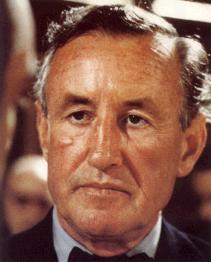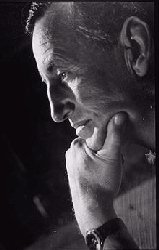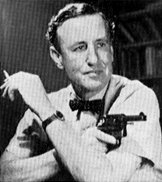|
|
|
MASTER  CREATER
CREATER

 IAN FLEMING
IAN FLEMING
Biography
Ian Fleming lived a remarkably uncompromising life in
a world full of compromises. To sum up his life in the short space available
would be an impossible task even for the most efficient writer, so all that
follows is a simple pastiche. Further reading is highly recommended.

Born in 1908 as the son of Valentine Fleming, and the
grandson of the wealthy Scottish banker Robert Fleming, Ian Lancaster Fleming
grew up the member of a rare class of Englishmen for whom all options are open.
The privilege of class and respect came not merely from his grandfather's money,
as wealth alone in England does not guarantee open doors. The Fleming family
earned their social stripes with service and blood. Ian's father was a
service-oriented land-owner in Oxfordshire and a member of Parliament. When
Valentine Fleming died in the Great War, Ian was 8 days shy of his ninth
birthday. Winston Churchill wrote the obituary for The Times.
Fleming's mother, Evelyn St. Croix Rose Fleming,
inherited Valentine's large estate in trust, making her a very wealthy woman.
The trust, though, cut her out should she ever re-marry. This provision
virtually guaranteed that she would remain forever Valentine's widow, regardless
of other loves or circumstances. These financial chains of Valentine Fleming's
will set the stage for the high-stakes financial pressures which would always
dog Ian Fleming's life.
Valentine's ghost lingered over Ian in many other
ways. His father would always be the daring young hero, larger than life,
articulate, straight as an arrow. In childhood prayers the Fleming children were
instructed to pray to be as good as their father. For Ian, that charge proved
too tall an order.
Fleming not only had to live with the ghost of his
father, but also with the shadow of his brother Peter, who after his father's
passing filled the role of patriarch of the family. Peter excelled at Eton and
later Oxford.
The knowledge of Ian's late father's looming wealth,
and Ian's lack of access to it was bound to make the young Fleming feel
disinherited. The elusive Fleming fortune and high achievements of Valentine and
Peter seem to have put a chip on Ian's shoulder. As Ian failed to fill their
shoes, it appears he became more determined to build his own empire, create his
own identity within the family, and be lauded for his own successes.
 Education
EducationIan won the athletic prize two years running at Eton,
but left before graduation over an incident involving a girl. It was an ignoble
end to his Eton years, but at Eton he was always just Peter's younger brother
and Valentine's son.
Fleming's career at the military academy Sandhurst
proved just as undistinguished, and he left without taking an officer's
commission. He complained in later years that he felt the continued
mechanization of the army made the idea of a conventional military career
unappealing. A mechanized army, though, is an army without heroes, or
personality. And Fleming's streak of independence and apparent need to make his
own identity did not fit well with conventional military conduct. Officially,
though, Fleming left after being caught out after curfew.
In due course, Fleming went to Europe to continue
schooling. Fleming found a home in the small Austrian town of Kitzbuhel where
his education changed drastically. In an environment totally unlike the strict
and conventional campuses of Eton and Sandhurst, Fleming, under the tutelage of
Forbes and Phyllis Dennis, finally found a place to create his own identity. At
Kitzbuhel no other students knew Valentine Fleming, war hero, and many students
did not know Peter Fleming, academic star (although Peter and Ian did visit the
school together the previous summer). The students only knew Ian, rakish,
handsome, cultured Etonian with a rapier wit and a certain cool lack of shyness
with women.
Forbes and Phyllis Dennis did know Peter and Ian very
well, and immediately realized that Ian must be allowed to excel on his own and
be in an environment where he did not compete for accolades with his brother
Peter. Through their careful work, Ian finally had the chance to become his own
person, and not just the black sheep brother of Peter and son of Valentine.

While Fleming found his own identity at Kitzbuhel, he
did not seem to find out what he wanted to do with his life. He wrote some short
stories and some poems, but made no pretensions, it seems, about being an
author. Eventually, Fleming set his sights on the foreign service exam, but to
his grave disappointment did not make the grade. Nonetheless, Fleming had set a
course for himself and worked hard to achieve his own goals. After the failure
to join the Foreign Service, Fleming turned to his brother's profession.
Following in his Peter's footsteps, Fleming became a journalist, joining
Reuters.
Fleming's greatest success in his brief Reuters career
was the reporting he did on a spy trial in Russia. While Fleming did not scoop
all of his competition, he did impress his fellow journalists. Ultimately,
though, Ian was the "other Fleming" journalist, as his brother Peter
hopped the globe writing colorful news from many distant and exotic locals.
Beyond the family implications, Fleming also discovered just how little money
journalists made. When Robert Fleming died in 1933 leaving no money to any of
his grandchildren, Ian once again saw the financial Rubicon which he felt
limited his life and future options. The vast family fortune was unavailable to
Ian until his mother died or re-married, and both options seemed unlikely.
Fleming made his decision, leaving journalism. In one of his few compromises,
Fleming, capitalizing on the family name, joined a London banking firm which he
hoped would make him rich.
Banking never earned Fleming the fortune he sought,
but it gave him independence. He took up residence in Belgravia at 22B Ebury
Street where he entertained friends in a portion of the old converted temple
where he lived. Ian had enough money to host dinner parties for his lose-knit
group Le Cercle gastronomique et des jeux de hasard. Fleming's love of the
off-beat and simple elegance impressed his friends. High-stakes bridge games,
elaborate meals and indifferent romances filled Fleming's off-work hours. Peter
Fleming churned out books of true adventure stories while Ian casually purchased
an important collection of scientific and political first editions. Peter could
be the writer while Ian ate, drank, and loved his way through life.
By 1939, it appears Fleming had become bored with the
plodding day-to-day existence of a banker. The ups and downs of the stock market
apparently did not provide enough intrigue for him. During his Reuters days,
Fleming had made friends in the Foreign Office, and maintained them even as a
banker. In 1939, Fleming oddly took on an assignment for the Times to return to
the Soviet Union to report on a trade mission. It appears that Fleming, in fact,
was all the time spying for the Foreign Office.
In May of 1939, Fleming started a more formal
attachment to the intelligence service, working with Naval Intelligence. Soon,
he was full-time assistant to the director, taking the rank of Lieutenant, and
later Commander. Fleming became the right-hand man to one of Britain's top
spymasters, Admiral John Godfrey.
The war was good to Fleming, tapping his imagination,
forcing him to work within discipline. Fleming schemed, plotted, and carried out
dangerous missions. From the famous Room 39 in the Admiralty building in
London's Whitehall, Fleming tossed out a myriad of off-beat ideas on how to
confuse, survey, and enrage the Germans. 
In a 1940 trip into a crumbling France, Fleming
supervised the escape from Dieppe, juggling the security needs of his country
against the crush of refugees seeking escape from the Nazi machine. With Fleming
flair, he spent one of his last evening eating and drinking some of the best
food in the country, and one of his last days coordinating the evacuation of
King Zog of Albania.
The "Fleming flair" proved to be his
greatest strength in Naval Intelligence. He dined at Scott's, White's, the
Dorchester, plotted intelligence operations, many of which were absurd, and many
of which proved ingenious. Yet, Fleming understood the business side of the war.
He understood his practical job, and the tight constraints of man-power, money
and supplies. He did not take his assignments lightly, always gravely aware of
the real human risks involved.
The "Fleming flair" also proved valuable in
one other aspect: writing. As assistant to Admiral Godfrey, Fleming wrote
countless memos and reports. His style and elegant arguments, plus his seemingly
limitless knowledge of his subjects made the usual dry missives a pleasure to
read. Eventually, Fleming wrote memos to William "Wild Bill" Donovan
on how to set up the OSS, forerunner to the CIA. For that bit of work, Fleming
received a revolver engraved with the thanks: "For Special Services."
Fleming traveled as Admiral Godfrey's right hand,
meeting J. Edgar Hoover in Washington and William Stephenson in New York.
Fleming worked closely with the later.
Deeper in the war, Fleming took charge of 30 Assault
Unit, a group of specially trained commandos who were sent on specific
intelligence missions. These missions often meant work behind the lines making
sure the Germans did not have a chance to destroy their valuable files. The 30
AU proved to be a great success. Fleming packed them off on missions while he
remained mostly desk-bound in London. Nonetheless, 30 AU was his group, and
their successes were heaped on his shoulders.
During the last year of the war, Fleming traveled to
Jamaica for a Naval conference. The trip, though brief, revealed the lush island
to Fleming. Here there was no war, no rationing, no food shortages. Fruit lay
rotting on the trees and fine rum flowed from the plantations. Fleming
immediately began planning for his escape to paradise.
Every person plans to run off to some tropical isle,
but few do. Real life, family, work, and monetary limitations get in the way.
Ian Fleming let none of these considerations stop him. When his war was over, he
would, with certainty, return to Jamaica, and not just as a tourist.
Fleming set to work. He purchased property, designed a
house, and set about doing paradise right. The house, Goldeneye, was like
Fleming's writing would prove to be: simple, direct, filled with panache, but
never elegant, or opulent. There was no hot-water plumbing, no glass in the
jalousied windows, no provision for air conditioning. Yet, the house quickly
became one of the most envied on the north coast of Jamaica.
After the war, Fleming set down his schedule. The
first week of January saw him leave England and travel to Jamaica. The first
week of March saw his return. He accepted his job at Kemsley newspapers without
compromise -- this portion of the year would be set aside for Jamaica or he
would look elsewhere for employment.
For 6 years Fleming traveled each winter to Jamaica,
lounging in paradise, romancing women, chasing the sunset, but it was not until
he faced the pressure of a married woman who was pregnant with his child did
Fleming start the writer's journey which would change his life and popular
culture forever.
The married woman, Lady Anne Rothermere, had for years
been having an affair with Ian, and now pregnant, the time had come for Fleming,
at almost 44 years of age to act like a grown-up and marry. As Fleming waited in
Jamaica for Anne's divorce to become final, he wrote the first draft of a novel,
Casino Royale.
By this time, 1952, Ian Fleming's circle of friends
included some of the top literary names in England. Fleming knew Noel Coward,
Eric Ambler, Peter Quennell, Patrick Leigh Fermor, and Cyril Connolly, among
others. Fleming had the charm and self-confidence to pick his friends,
compartmentalize them, and the self-reliance to never depend on them.
 Fleming's
career as a writer deserves more examination than can be offered here, but
suffice it to say, over the next 12 years, Ian Fleming transformed his elite
existence, his arrogance, his style, and his acid wit into some of the greatest
thrillers ever written. Fleming incurred the respect of authors as diverse as
Raymond Chandler, Kingsley Amis, and Edith Sitwell. His fans included John,
Jackie, and Bobby Kennedy, and his social circle included Prime Minister Anthony
Eden, Evelyn Waugh, and Somerset Maugham.
Fleming's
career as a writer deserves more examination than can be offered here, but
suffice it to say, over the next 12 years, Ian Fleming transformed his elite
existence, his arrogance, his style, and his acid wit into some of the greatest
thrillers ever written. Fleming incurred the respect of authors as diverse as
Raymond Chandler, Kingsley Amis, and Edith Sitwell. His fans included John,
Jackie, and Bobby Kennedy, and his social circle included Prime Minister Anthony
Eden, Evelyn Waugh, and Somerset Maugham.
Fleming filled out the 12 years of Bond with great
adventure journalism. Even in stories which had little action or pay off, such
as his short non-fiction book, The Diamond Smugglers, the
"Fleming-flair" ensured exciting reading. He wrote the Atticus column
for the Sunday Times, proving a wonderful conduit for inside intelligence
information, and clever rebukes.
Regardless of book sales or family obligations,
Fleming managed to live the life he wanted. As the years passed, his passion for
golfing increased so he took more time with it. Fleming's long-term fascination
with America grew, so he traveled there more often.
Fleming's full life caught up with him through his
heart. It may be that years of drinking and smoking took their toll, or that the
butter-rich cooking Fleming loved was the culprit. Or maybe it was just
genetics. Whatever the cause, Fleming's health declined in the late 1950s. This
plus anxieties in the marriage increased Fleming's depression. With the success
of Bond, the world came knocking at Fleming's door, and he had a harder time
shutting those out that he did not want in his life.
Nonetheless, Fleming fought the loosing battle of his
weakening heart by throwing more fuel on the fire. He continued to drink and
smoke, making some excuses but not many. He wrote books he wanted to read, and
traveled the world with style and authority.
In 1964, Fleming suffered a severe debilitating chest
cold, which combined with pleurisy, forcing a slow recovery. That summer his
mother died, leaving behind her small fortune from Valentine Fleming's trust. By
this time, Fleming had already earned his own fortune, created his own identity,
and ruled his own literary empire. His doctors advised him he was too ill to
attend his mother's service, but he went anyway.
Fleming tried to force his recovery, dictating letters
in protest of his condition, as if by sheer will, Fleming could regain his
health. In August went to St. Georges to meet with the golf committee. His heart
failed him, and the night of August 11, Ian Fleming began to bleed to death from
within. At 1 a.m. on August 12, 1964, Ian Fleming died at the age of 56. He is
buried in Sevenhampton, near Swindon not too far from the Welsh border. His wife
Anne died in 1981. Fleming's only child, Casper, died from a suicidal drug
overdose in 1975. Both are buried beside Ian beneath a simple obelisk monument
in the shadow of the local stone church.